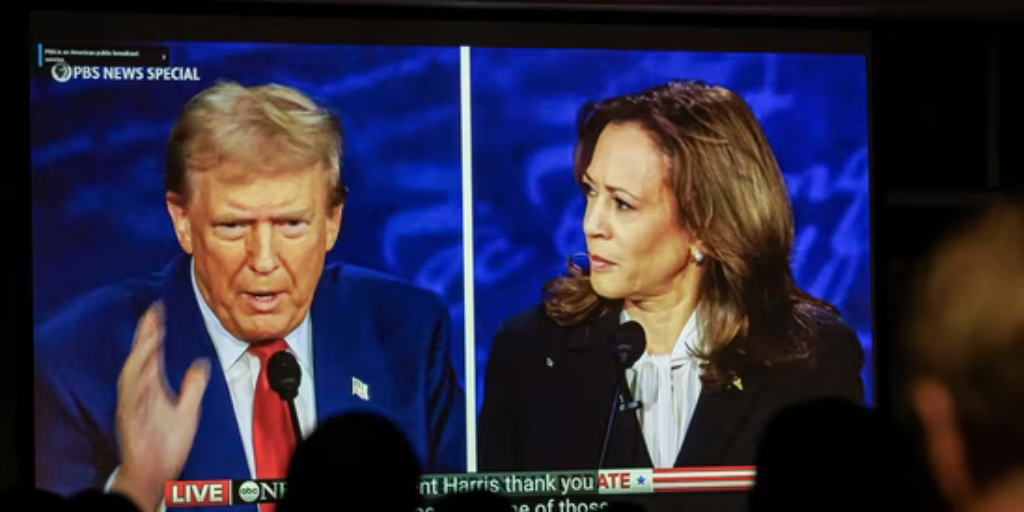With the 2024 presidential election intensifying, the debates among candidates provide a vital opportunity to gain insights into their policies, personalities, and potential presidential leadership. The recent clash between Vice President Kamala Harris and former President Donald Trump has garnered substantial attention, prompting various analyses from media sources. Now, let’s delve into how the performances of these individuals have been interpreted by the US media.
The Debate Dynamics
The debate was marked by sharp exchanges and contrasting visions for America’s future. Kamala Harris, representing the Democratic ticket, emphasized unity, progress, and social justice. In contrast, Donald Trump, the Republican nominee, focused on economic revival, border security, and a return to traditional values.
Kamala Harris: The Vice President took a strategic approach, leveraging her experience in government and her role in the current administration. Her arguments centered around the achievements of the Biden administration, particularly in economic recovery and healthcare reform. Harris also addressed the need for systemic changes to address climate change and inequality, framing herself as a champion for working-class Americans and marginalized communities.
Donald Trump: Trump’s performance was characterized by his characteristic brashness and directness. He reiterated his campaign promises from 2016, including tax cuts, deregulation, and a strong stance on immigration. Trump also criticized the Biden administration’s handling of foreign policy and domestic issues, positioning himself as a political outsider who can bring real change.
Media Reactions and Analysis
1. CNN: CNN’s post-debate analysis highlighted Harris’s ability to articulate her policy positions clearly and connect them to real-world impacts. Analysts praised her calm demeanor and her ability to pivot to discussing her vision for America, though some noted that she struggled to directly address some of Trump’s more aggressive points. CNN’s take was that Harris won on substance, showcasing detailed plans and a strong command of facts.
2. Fox News: Fox News provided a different perspective, focusing on Trump’s assertive performance. Analysts lauded Trump for his energetic delivery and ability to dominate the debate stage. They argued that Trump’s performance might resonate more with voters frustrated with the status quo, suggesting that his straightforward approach could galvanize his base. However, they also pointed out that Trump’s repeated use of contentious rhetoric might alienate moderates.
3. The New York Times: The Times’ analysis emphasized the debate’s tone and the candidates’ ability to engage with complex issues. They commended Harris for her calm, methodical responses, but noted that her performance might not have been as impactful in swaying undecided voters. The Times observed that while Trump’s rhetoric was compelling to his supporters, it also included several inaccuracies and inflammatory statements that could turn off independents and swing voters.
4. Politico: Politico took a balanced approach, noting that both candidates had moments of strength and weakness. Harris was praised for her policy depth and for presenting a vision that aligned with progressive values. On the other hand, Trump’s confrontational style and strong emphasis on economic issues were seen as effective in energizing his base. Politico suggested that the debate might not have changed the overall trajectory of the race but provided clear insights into each candidate’s strategy.
5. The Washington Post: The Post’s analysis focused on the broader implications of the debate. They pointed out that Harris’s focus on detailed policy proposals could appeal to voters looking for depth and foresight. Conversely, Trump’s performance was seen as reinforcing his brand of political outsider status, which could be a double-edged sword. The Post concluded that while Harris might have won in terms of policy clarity, Trump’s performance could have bolstered his appeal among certain voter segments.
Conclusion
Determining a “winner” in a debate often depends on which aspects of the candidates’ performances resonate most with individual viewers and voters. Harris’s methodical approach and policy depth versus Trump’s energetic and confrontational style present two distinct strategies for engaging with the electorate. As the media analyses suggest, both candidates have strengths that appeal to different segments of the American population.
With the election still months away, this debate may only be one piece of the puzzle. Voters will continue to weigh the candidates’ performances, policies, and overall vision for the country as they make their decisions. For now, the debate has set the stage for further discussions and campaign strategies as the race to the White House intensifies.

